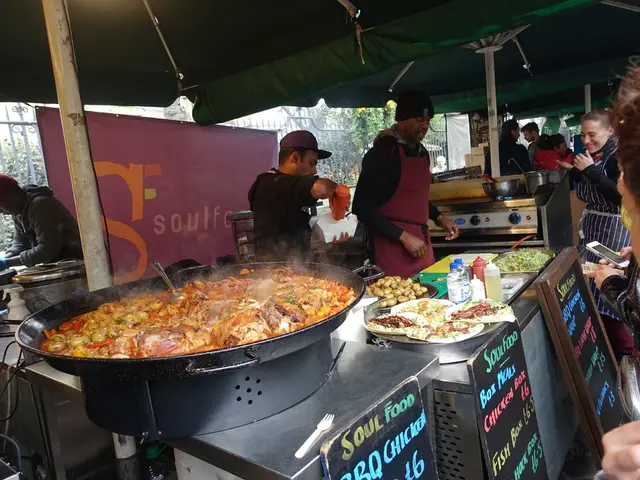Activists emphasize disparities in the advancement of efforts to combat global hunger
In a sobering report launched at the UN's Food Systems Summit (UNFSS) co-hosted by Ethiopia and Italy, it has been revealed that climate change is causing disruptions to harvests, supply chains, and humanitarian aid worldwide, leading to increased food insecurity.
The 2025 State of Food Security and Nutrition in the World (SOFI) survey shows a decline in global hunger levels from 8.5% in 2023 to 8.2% in 2024. However, this progress is overshadowed by the severe food insecurity in Africa, where over 307 million Africans experienced hunger in 2024.
The situation in Gaza is particularly dire, with the Integrated Food Security Phase Classification (IPC) warning that widespread starvation, malnutrition, and disease are driving deaths in the region. In fact, Gaza is facing the worst recorded hunger crisis in the history of the IPC, with 100% of its population experiencing acute food insecurity.
Similarly, Sudan and South Sudan are also grappling with high levels of acute food insecurity, with over half of their populations suffering from this condition.
Key drivers of this crisis include ongoing conflicts that disrupt food supply chains, extreme weather events like droughts and floods linked to climate change which destroy crops, and rising food prices fueled by global economic tensions. Small-scale farmers, who produce up to 70% of Africa’s food, remain severely underfunded in climate finance, limiting their ability to adapt to these shocks.
International humanitarian assistance is being directed towards conflict zones like Gaza and Sudan, but the effectiveness of these efforts is challenged by drastic cuts in international aid funding, which risk reversing the progress made. The UN's International Fund for Agricultural Development emphasizes the need for increased support to smallholder farmers and integrated responses addressing conflict relief, economic stabilization, and climate adaptation.
UN Deputy Secretary-General, Amina Jane Mohammed, expressed concern about the food insecurity situation in Gaza and Sudan at the UNFSS, stating that overlapping crises are exposing the deep fragility of food systems and cooperation must replace conflict. The UN has spoken out several times about access to food for residents of Gaza and Sudan, citing it as a matter of international humanitarian law.
The African Union (AU) is also committed to addressing the food insecurity situation in Sudan, and Mahamoud Ali Youssouf, the chairperson of the AU Commission, urged AU member states to devote 10% of their gross domestic product to agriculture to help foster nutritional resilience.
The situation in Africa is expected to worsen, with projections indicating that by 2030, almost 60% of those at risk of chronic hunger will be in Africa. This is a concerning development, as nearly half of the world's hungry people currently live in Africa, a figure expected to rise to 60% by 2030.
Women and children are disproportionately affected by this crisis, with many failing to achieve minimum dietary diversity and high rates of child malnutrition linked to food price shocks. The costs of a healthy diet have also increased, pricing many out of access to nutritious food, compounding malnutrition and hunger.
In conclusion, addressing the food insecurity crisis in Gaza, Sudan, and Africa requires coordinated humanitarian aid, sustained international funding, and focused support for agricultural resilience amid ongoing conflict and climate challenges. The UN chief Antonio Guterres stated that food should not be used as a weapon of war, and FAO chief Dongyu Qu stressed the need for coordinated global action based on shared responsibility, solidarity, and sound evidence.
- Sudan and South Sudan, like Gaza, are experiencing high levels of acute food insecurity, affecting over half of their populations.
- The African Union (AU) has called for AU member states to allocate 10% of their GDP to agriculture to help foster nutritional resilience in Africa.
- The situation in Africa is expected to worsen, with projections indicating that by 2030, nearly half of the world's hungry people will live in Africa, a figure expected to rise to 60%.
- In the face of the increasing food insecurity in Africa, the UN's International Fund for Agricultural Development emphasizes the need for increased support to smallholder farmers.
- The UN's Food Systems Summit (UNFSS) has revealed that climate change is causing disruptions to food systems and humanitarian aid not only worldwide but also in Africa, leading to increased food insecurity.
- The costs of a healthy diet have increased, exacerbating malnutrition and hunger, particularly among women and children in Africa.




